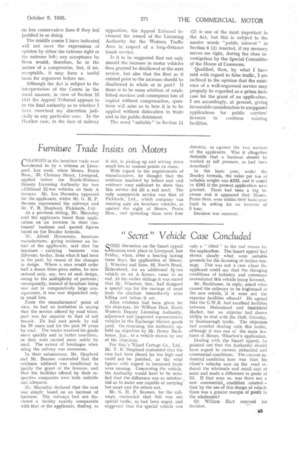"Secret" Vehicle Case Concluded
Page 37

If you've noticed an error in this article please click here to report it so we can fix it.
S0111E discussion on the Smart appeal decision took place at Liverpool, last Friday, when, after a hearing lasting three days, the application of Messrs. J. Wharton and Sons, 32, North Road, Birkenhead, for an additional 31-ton vehicle on an A licence, came to an end. At the earlier sittings it was stated that Mr. Wharton, Sen., had designed a special van for the carriage of meat from the abattoir immediately after killing and before it set.
After evidence had been given for the objectors, Sir William Hart, North Western Deputy Licensing Authority, adjourned and inspected representative vehicles in the Exchange Station goods yard. On returning, the Authority upheld an objection by Mr. Henry Backhouse, Jun., to a vehicle shown by one of the objectors.
For Hay's Wharf Cartage Co., Ltd.. Mr. V. 12. Shepherd contended that the case had been placed far too high and could not be justified, as the vital figures with regard to increased trade were missing. Concerning the vehicle, the Authority would have to be satisfied that the difference was so substantial as to make one capable of carrying hot meat and the others not.
Mr. G. H. P. Bearnes, for the railways, contended that tla was not special traffic, as had been urged, and suggested that the special vehicle was
only a "'blind " to the real reason for the application. The Smart appeal bad shown clearly what, were suitable grounds for the licensing of further tonnage. This was not a case where the applicant could say that the changing conditions of industry and commerce necessitated this vehicle being licensed.
Mr. Backhouse, in reply, asked what caused the railways to be frightened of the new vehicle, if it were not the superior facilities offered? He agreed that the G.W.R. had excellent facilities between Birkenhead and Smithfield Market, but no objector bad shown ability to deal with the Hull, Grimsby, or Scarborough traffic. The objectors had avoided dealing with this traffic, although it was one of the main features of Messrs. Wharton's application.
Dealing with the Smart appeal, he pointed out that the Authority should have regard to current industrial and commercial conditions, The current industrial condition here was that his client's vehicles now on the road reduced the wholesale and retail cost of meat and made a difference in profit of 2d. If that were so, was there not a new commercial, condition created— that by the use of this design of vehicle there was a greater margin of profit to the wholesaler?
Sir William Hart reserved his




























































































